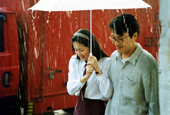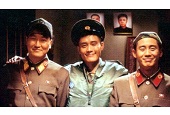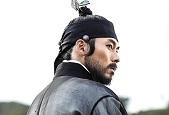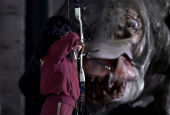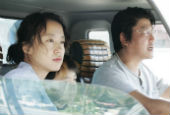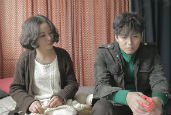Seopyonje (1993)
Directed by Im Kwon-taek
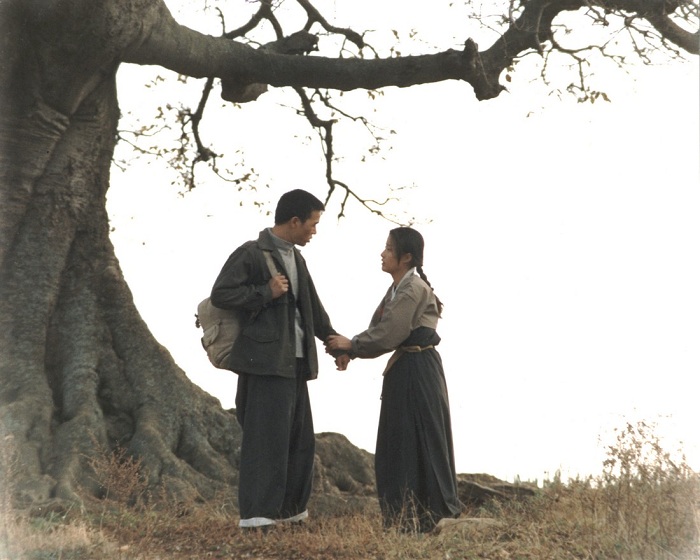
Comments by Kim Si-mu, film critic and Busan International Film Festival judge
Released in 1993, "Seopyonje" broke all-time box-office records. It is the 93rd work of Director Im Kwon-taek. The flashback technique, considered one of the important characteristics of Im's work, is featured throughout "Seopyonje" as well. The first scene shows DongHo in his 20s at a tavern asking after his older sister. The sister he is desperately looking for is Song(松) Hwa(花), meaning pine tree and flower. SongHwa is not there though, and so the camera begins to track down traces of her within the memories of DongHo.
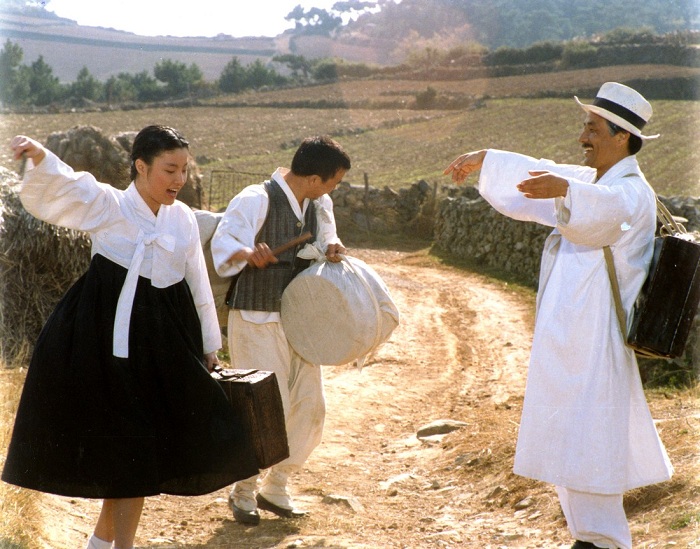
For YuBong, pansori is the most important thing in the world. He is interested in nothing but teaching it to DongHo and SongHwa. The three family members travel around the nation to make ends meet. Concerned about the dim future of pansori, DongHo resists the self-righteous attitude of his father and finally leaves home, breaking free from the family bond. After some time, when he grows up to become an adult, DongHo starts to search for his family.
One day on the street, DongHo happens to run into a painter he used to know called Naksan. He is told that YuBong died right after the war and caused SongHwa to lose her sight because YuBong thought it necessary for her to develop han. Han is a Korean concept that refers to unresolved resentment or deep emotional pain and would be needed in order to produce a good sound.
In this part, we need to think about "humanism," one of the most commonly used words to define the work of Director Im. At least in "Seopyonje," however, Im brings up the notion of art for art's sake, instead of humanism. His act in making his daughter blind seems not to have anything to do with humanism or family affection.
The irony is that even though his daughter becomes blind, she never finds han in her heart. SongHwa simply accepts the situation as her destiny and obeys her father as well as the society she belongs to.
That means YuBong failed in what he was attempting. His failure is caused not because he persuaded his daughter to eat a poisonous herb but because he forced her to experience the emotional feelings he had in a very artificial way. His failure is a natural consequence. YuBong must have regarded the feelings as something objective and concrete.
In fact, the emotional feeling of han is something that should come from one's personal experience. How SongHwa expresses her own han through her singing becomes the main narrative of the film.
What I want to point out is that we should forget about the old concept of humanism in order to understand the strong message of the film. What's more important is that Director Im even breaks free from the notion of art for art's sake.
When the film draws to an end DongHo, who desperately misses SongHwa, encounters her. SongHwa is living with a man named CheonGa at a shabby tavern. Without telling her who he is, DongHo calmly picks up a drum and asks her to sing. The duo performs pansori late into the night. They never tell each other who they are. SongHwa already recognized DongHo by his drum beats. But she never calls him by name. She showcases a performance of Simcheongga (The Song of Simcheong). It is perfect, better than ever before, and proves that she has become a master of pansori.
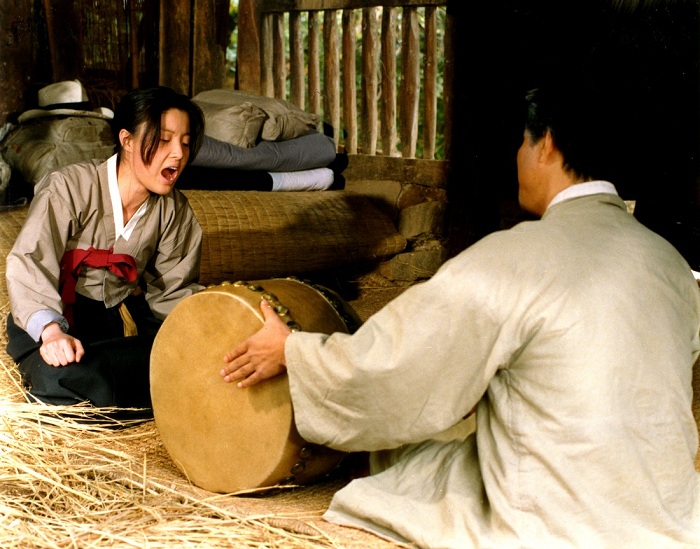
The next morning, DongHo leaves the tavern. SongHwa also prepares to leave the place as she has no more reason to stay. CheonGa tells SongHwa that the performance felt like the physical love of two human beings. He asks her why she pretended not to know her brother. SongHwa says she doesn't want to hurt her han. This conversation would allow us a glimpse into a part of SongHwa's han.
What do her words mean? She said she doesn't want to hurt her han. She neither blamed her father for making her lose her sight, nor her brother who left the family.
In fact, DongHo and SongHwa do not share the same bloodline. Ever since they were young, they loved each other. The circumstance that accidentally made them part of the same family, however, has limited their relationship. DongHo is not a simple brother to SongHwa, but a man she is in love with. It was the same for him too.
YuBong was a father to SongHwa. He raised her as his own for all her life. She had no choice but to think of DongHo as a brother.
If nothing else, this destined sad love can only leave han in the heart of SongHwa. The situation that has precluded her love has become a source of emotional pain beyond description. That's why SongHwa left some traces of sound behind when she moved, that helped DongHo finally find SongHwa. When they were reunited, however, the two chose to connect through pansori, the mix of singing and drumming. They may have wanted something more, but that would have affected the han. The doctrines of Freud appears to apply here in this film.
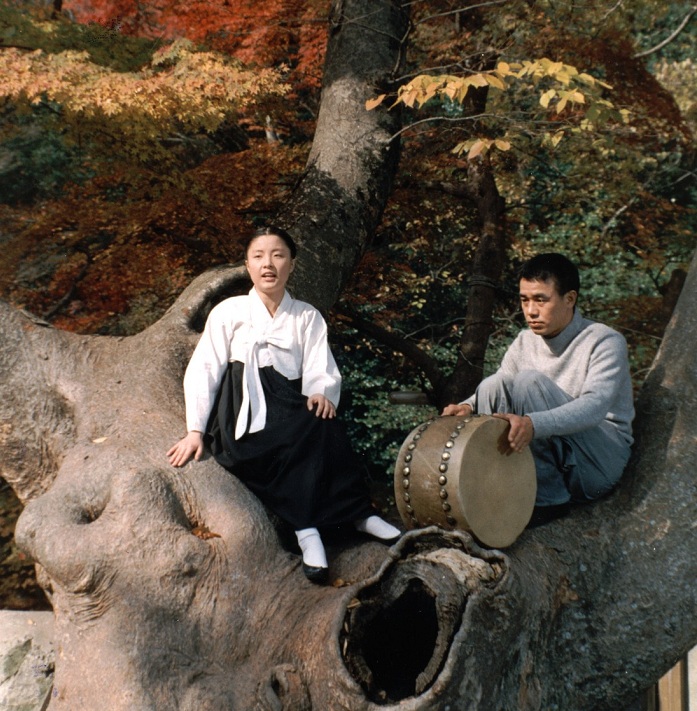
From this perspective, what Director Im wants to describe through the film is not the warm affections of humans. Nor is it art for art's sake. He must have wanted to tell a heartbreaking love story.
YuBong says in the film, "Dongpyonje is heavy while Seopyonje is more emotional and mournful. The two songs know no bounds when they pass over the han."
This implicitly suggests the core theme of the film.
*This series of articles has been made possible through the cooperation of the Korean Film Archive.
*Click here to see previous parts of our series of Korea.net's must-see films.
Directed by Im Kwon-taek

It is the early 1960s. A man in his 30s arrives at a tavern in the countryside. He thinks about his past as he listens to a rendition of pansori, a traditional form of lyrical storytelling, being played by the owner of the tavern.
That man is DongHo, played by Kim Gyu-cheol. When he was young, DongHo was given a strict musical upbringing by YuBong, played by Kim Myeong-gon, who is himself an outstanding pansori singer.
DongHo's mother, a widow, has an affair with YuBong and together they leave town. There are four of them now living together - DongHo, his mother, YuBong, and his daughter SongHwa, who was originally an orphan. Her character is played by Oh Jeong-hae. DongHo's mother, however, dies during childbirth, leaving just the three of them.
YuBong teaches pansori to the two children, singing for SongHwa and drumming for DongHo. However, DongHo can't understand why they need to learn pansori while the nation goes through a serious economic struggle caused by war. DongHo has several arguments with YuBong and finally leaves home. After DongHo goes, SongHwa neither sings nor eats. After a long passage of time, DongHo starts asking around in search of his sister and they are finally reunited at a liquor store. The brother and sister do not say anything, they just sing and drum. The next morning, DongHo and SongHwa go separate ways without saying a word.
Comments by Kim Si-mu, film critic and Busan International Film Festival judge
Released in 1993, "Seopyonje" broke all-time box-office records. It is the 93rd work of Director Im Kwon-taek. The flashback technique, considered one of the important characteristics of Im's work, is featured throughout "Seopyonje" as well. The first scene shows DongHo in his 20s at a tavern asking after his older sister. The sister he is desperately looking for is Song(松) Hwa(花), meaning pine tree and flower. SongHwa is not there though, and so the camera begins to track down traces of her within the memories of DongHo.

For YuBong, pansori is the most important thing in the world. He is interested in nothing but teaching it to DongHo and SongHwa. The three family members travel around the nation to make ends meet. Concerned about the dim future of pansori, DongHo resists the self-righteous attitude of his father and finally leaves home, breaking free from the family bond. After some time, when he grows up to become an adult, DongHo starts to search for his family.
One day on the street, DongHo happens to run into a painter he used to know called Naksan. He is told that YuBong died right after the war and caused SongHwa to lose her sight because YuBong thought it necessary for her to develop han. Han is a Korean concept that refers to unresolved resentment or deep emotional pain and would be needed in order to produce a good sound.
In this part, we need to think about "humanism," one of the most commonly used words to define the work of Director Im. At least in "Seopyonje," however, Im brings up the notion of art for art's sake, instead of humanism. His act in making his daughter blind seems not to have anything to do with humanism or family affection.
The irony is that even though his daughter becomes blind, she never finds han in her heart. SongHwa simply accepts the situation as her destiny and obeys her father as well as the society she belongs to.
That means YuBong failed in what he was attempting. His failure is caused not because he persuaded his daughter to eat a poisonous herb but because he forced her to experience the emotional feelings he had in a very artificial way. His failure is a natural consequence. YuBong must have regarded the feelings as something objective and concrete.
In fact, the emotional feeling of han is something that should come from one's personal experience. How SongHwa expresses her own han through her singing becomes the main narrative of the film.
What I want to point out is that we should forget about the old concept of humanism in order to understand the strong message of the film. What's more important is that Director Im even breaks free from the notion of art for art's sake.
When the film draws to an end DongHo, who desperately misses SongHwa, encounters her. SongHwa is living with a man named CheonGa at a shabby tavern. Without telling her who he is, DongHo calmly picks up a drum and asks her to sing. The duo performs pansori late into the night. They never tell each other who they are. SongHwa already recognized DongHo by his drum beats. But she never calls him by name. She showcases a performance of Simcheongga (The Song of Simcheong). It is perfect, better than ever before, and proves that she has become a master of pansori.

The next morning, DongHo leaves the tavern. SongHwa also prepares to leave the place as she has no more reason to stay. CheonGa tells SongHwa that the performance felt like the physical love of two human beings. He asks her why she pretended not to know her brother. SongHwa says she doesn't want to hurt her han. This conversation would allow us a glimpse into a part of SongHwa's han.
What do her words mean? She said she doesn't want to hurt her han. She neither blamed her father for making her lose her sight, nor her brother who left the family.
In fact, DongHo and SongHwa do not share the same bloodline. Ever since they were young, they loved each other. The circumstance that accidentally made them part of the same family, however, has limited their relationship. DongHo is not a simple brother to SongHwa, but a man she is in love with. It was the same for him too.
YuBong was a father to SongHwa. He raised her as his own for all her life. She had no choice but to think of DongHo as a brother.
If nothing else, this destined sad love can only leave han in the heart of SongHwa. The situation that has precluded her love has become a source of emotional pain beyond description. That's why SongHwa left some traces of sound behind when she moved, that helped DongHo finally find SongHwa. When they were reunited, however, the two chose to connect through pansori, the mix of singing and drumming. They may have wanted something more, but that would have affected the han. The doctrines of Freud appears to apply here in this film.

From this perspective, what Director Im wants to describe through the film is not the warm affections of humans. Nor is it art for art's sake. He must have wanted to tell a heartbreaking love story.
YuBong says in the film, "Dongpyonje is heavy while Seopyonje is more emotional and mournful. The two songs know no bounds when they pass over the han."
This implicitly suggests the core theme of the film.
*This series of articles has been made possible through the cooperation of the Korean Film Archive.
*Click here to see previous parts of our series of Korea.net's must-see films.
